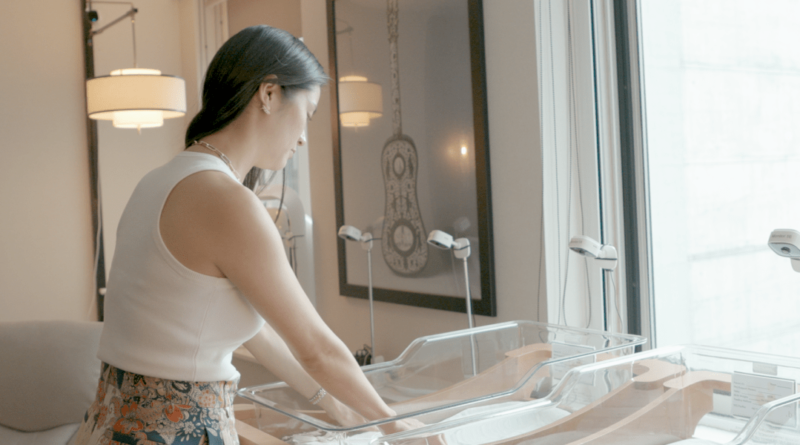For $1,000 a night, new moms can live in luxury at NYC's postnatal retreat, where staff help detect postpartum depression
After Boram Nam gave birth to her two children in 2010 and then in 2014, she couldn’t make sense of the guilt, stress, and fear she experienced. Her husband worked at their startup at the time, and her parents lived in Korea. She had to manage her feelings of distress largely on her own.
“I wasn’t celebrating … I just felt really guilty, and that was literally eating me alive,” she tells Fortune.
Now, it’s beyond dispute that Nam had postpartum depression, which affects up to 15% of people and disproportionately affects people of color. Its symptoms include feelings of depression, loss of pleasure, guilt, trouble sleeping, fatigue, and reduced energy.
“I was literally microwaving a wet towel to make myself feel better, giving myself a massage around the breast, and trying to set up a foot bath for myself,” Nam says.
The incidence of postpartum depression has increased in the last decade, so more education and support for mothers is crucial, Nam says. “The recovery journey was just really rough,” she says.
Her experience propelled her to open a retreat supporting new mothers. Nam launched Boram Care, a luxury postnatal retreat, in New York City in the spring of 2022. “That struggle really became the founding motivation for us,” says Nam, who cofounded the center alongside her husband.
“Recovery isn’t just ‘okay, baby is out’”
Many new parents fear that mental health symptoms after giving birth reflect an inability to care for their child, which has heavily stigmatized a relatively common physiological phenomenon. Symptoms of postpartum depression, therefore, can go unreported. “Most birth complications whether it’s physical or emotional or mental that happen postpartum go often undetected,” Sarah Mallin, director of operations at Boram Care, tells Fortune.
“Recovery isn’t just ‘okay, baby is out. Let’s go back to what it was before,’” Nam says. “There’s so many things happening in your body. It’s not just hormonal.”
Located on 56th Street between 6th and 7th Avenue at the Thompson Central Park Hotel, Boram Care’s section of a hotel floor offers new mothers services ranging from $950 to $1,000 a night. The package includes a hotel room, three meals, and 24/7 postpartum support from a care team—including postpartum doulas who offer lactation assistance, emotional support, and administer a postpartum depression survey.
The center has a staffed nursery, allowing sleep-deprived new mothers a break. Visitors can monitor it through a camera from their room. They can also participate in workshops about the symptoms of postpartum depression, lactation practices, and baby CPR. The center’s couch-filled gathering room, which has a bright white and green neon sign that reads Start Strong #BoramCare, is where visitors go for sterilized breast pumps, to-go snacks, and foot rubs.
New moms usually stay between three and seven nights, says Nam, who adds it doesn’t substitute for medical treatment. After checking out, residents have a follow-up call with the care team, who can connect them with outside community resources.
A model of postnatal care from South Korea
Nam modeled her business after what she saw in South Korea, where postnatal centers are widespread. Boram translates to the fruits of one’s labor in Korean, she says. After going through postpartum depression without much knowledge of the condition or the treatment options, Nam created the postpartum center she didn’t have.
“All my friends who were having babies in Korea, were checking themselves into one of these retreats, feeling better, feeling supported, learning so much more, and just feeling ready to go back to what they had before,” she says, recalling her Excel sheet weighing the pros and cons of giving birth in the U.S. or back home with her family in South Korea.
Many new moms in South Korea attend postnatal retreats for at least 14 nights, for a “couple hundred dollars a night,” according to Nam—a considerably lower price than she offers at Boram.
“This culture of supporting women after birth has been around for centuries,” Nam says. “But it turned into a business about 20 years ago in South Korea when people were migrating to the city, living more in the urban setting away from their village, away from their families. It became a business idea to set up a facility to support women right after giving birth.”
In the last couple of decades, this model became popularized across Asia in areas such as Beijing, Malaysia, and Singapore.
Postnatal benefits
Boram isn’t immune to the fact that her company’s services are inaccessible to most. About 5% of customers come from employee partnerships. Nam aims to increase the percentage to 10% by 2024, hoping more company’s offer Boram’s services as a benefit or at a discounted rate to gain customers who cannot pay out of pocket.
“It’s really quality of recovery than quantity of time spent on maternity. To employers, they sometimes raise, ‘so what’s my ROI?’” she says. “Well, your ROI is that your employees will come back feeling supported and energized, and feeling appreciative of what you did for them.”
She says this is especially important for women, many of whom feel apprehensive about taking additional time off before returning to work after giving birth.
“There’s enormous social pressure about ‘hey, you want equal pay? Come right back after giving birth, or your desk is going to be gone,’” Nam says.
Boram Care is all about recovery, Nam says. If you can shell out the money, it doesn’t hurt that the care comes with the bonus of a luxurious stay in the heart of NYC with a view of Central Park.
“I think we really began to revolutionize the way people understand postpartum recovery,” Nam says. “We can increase the awareness together.”




